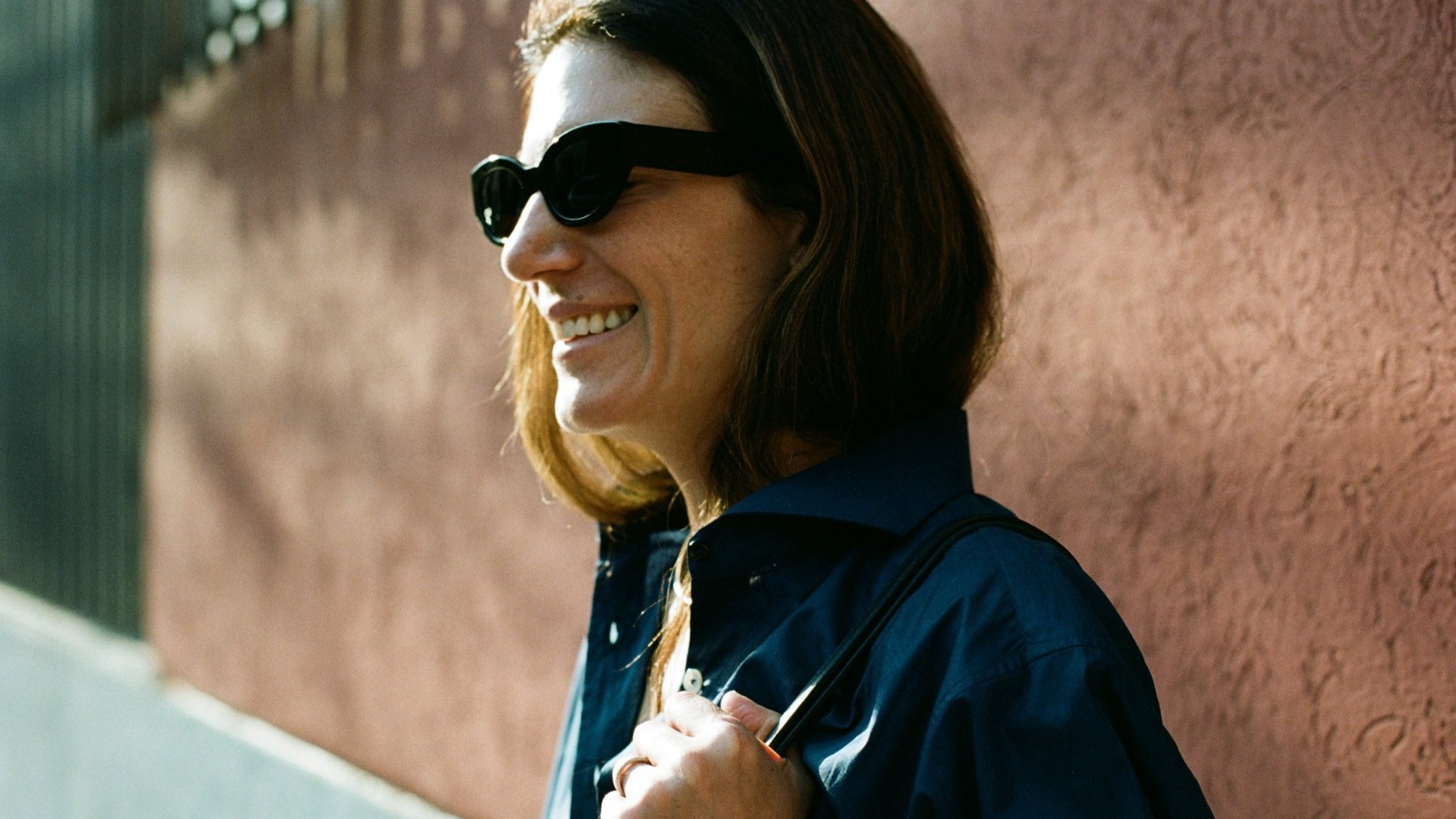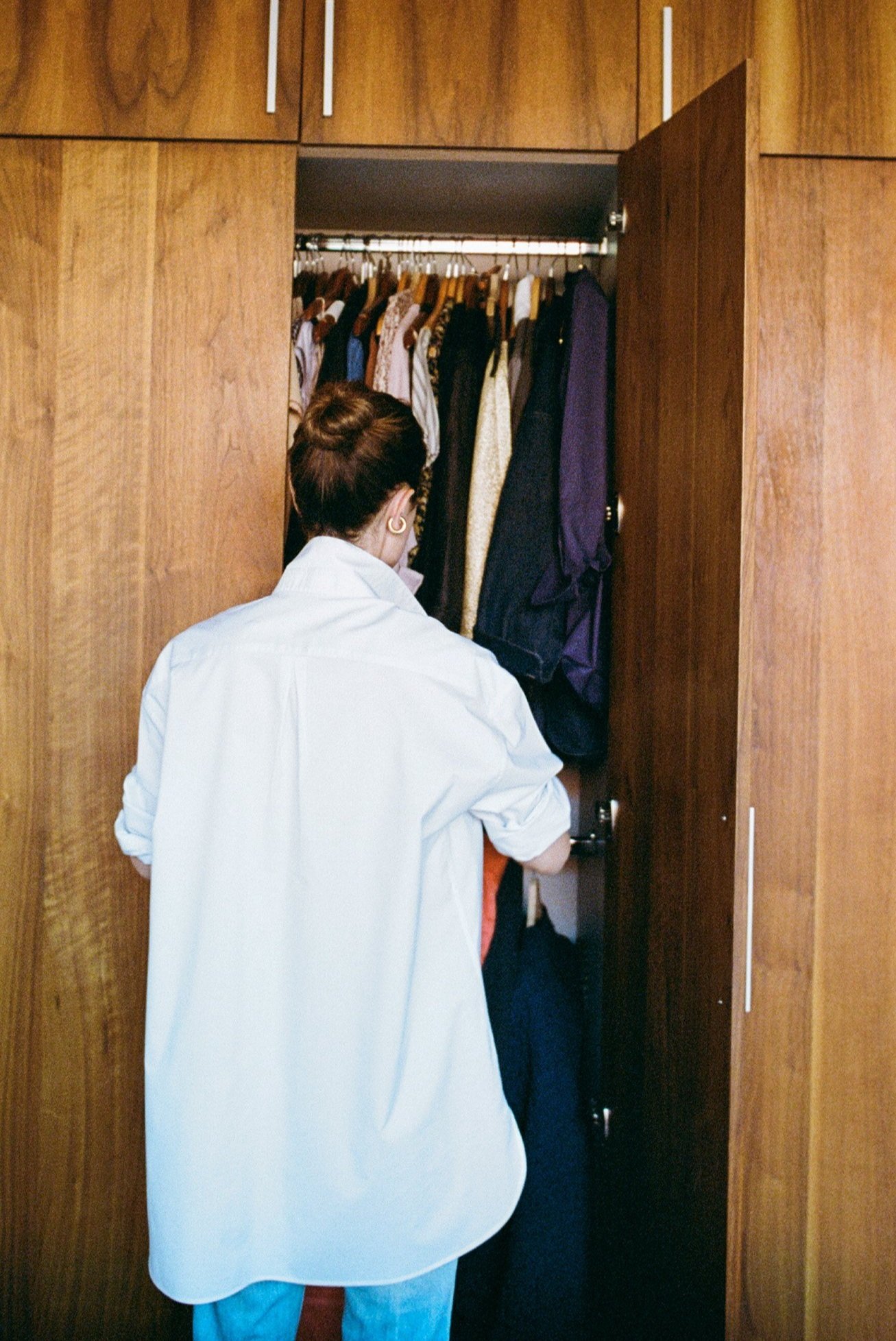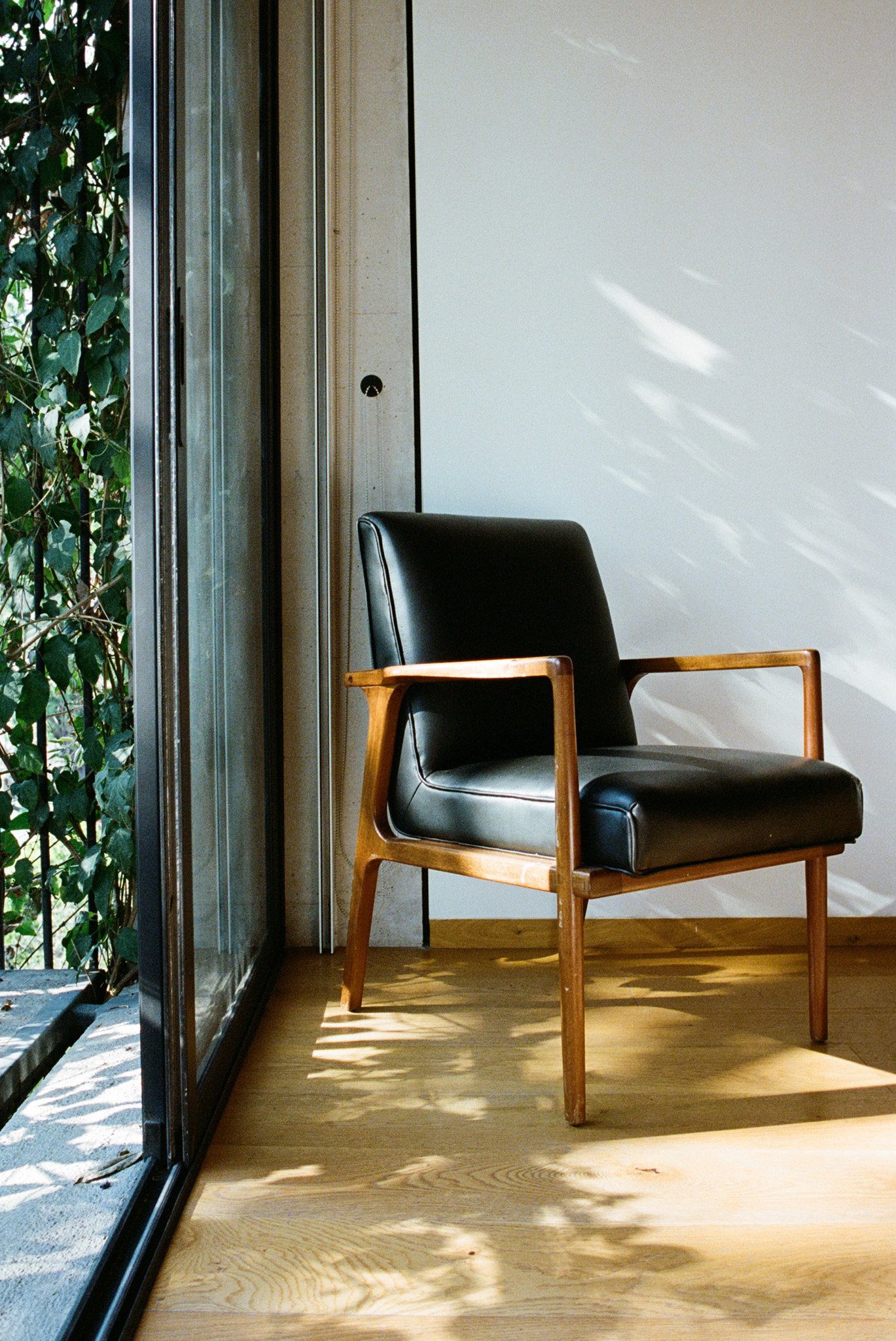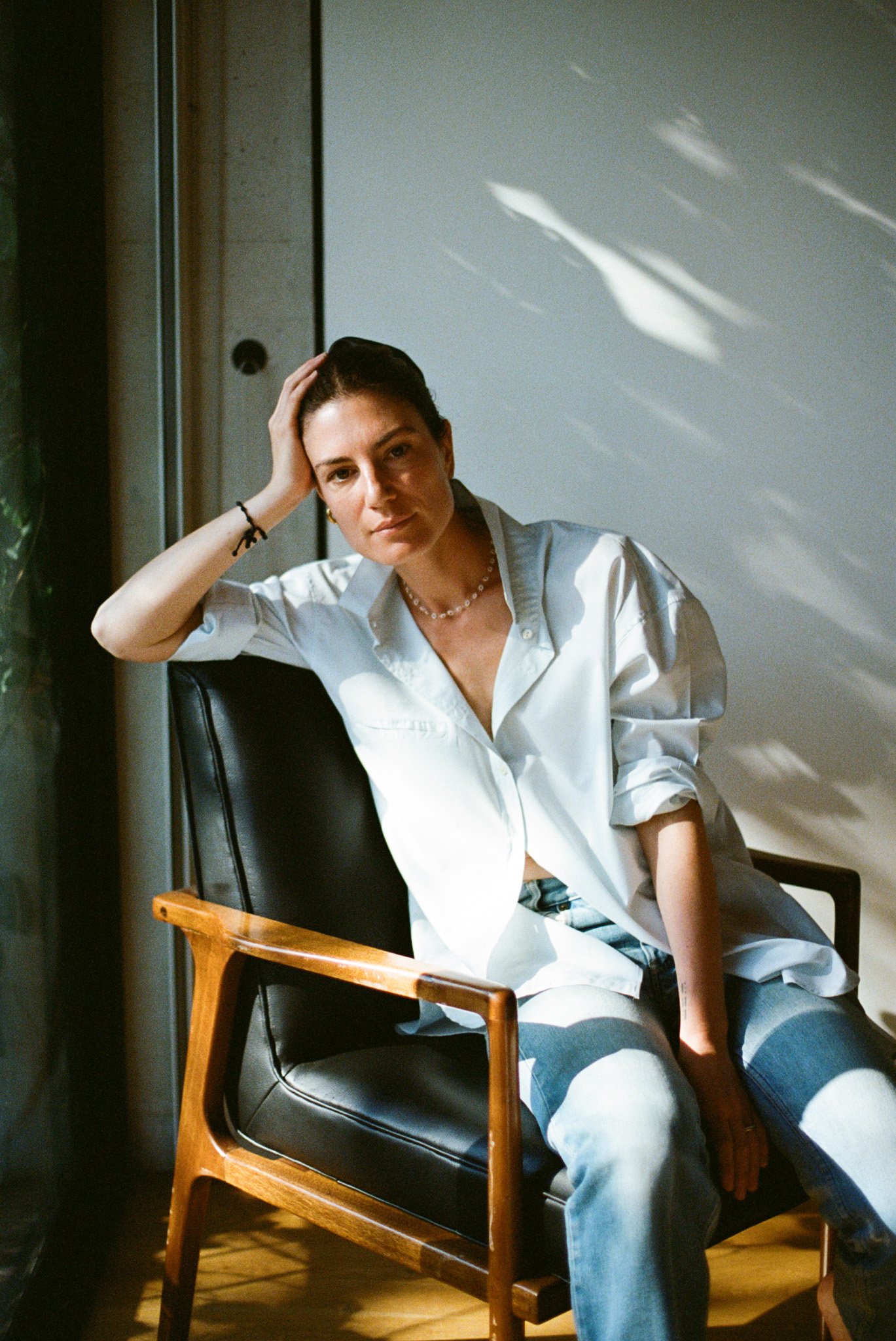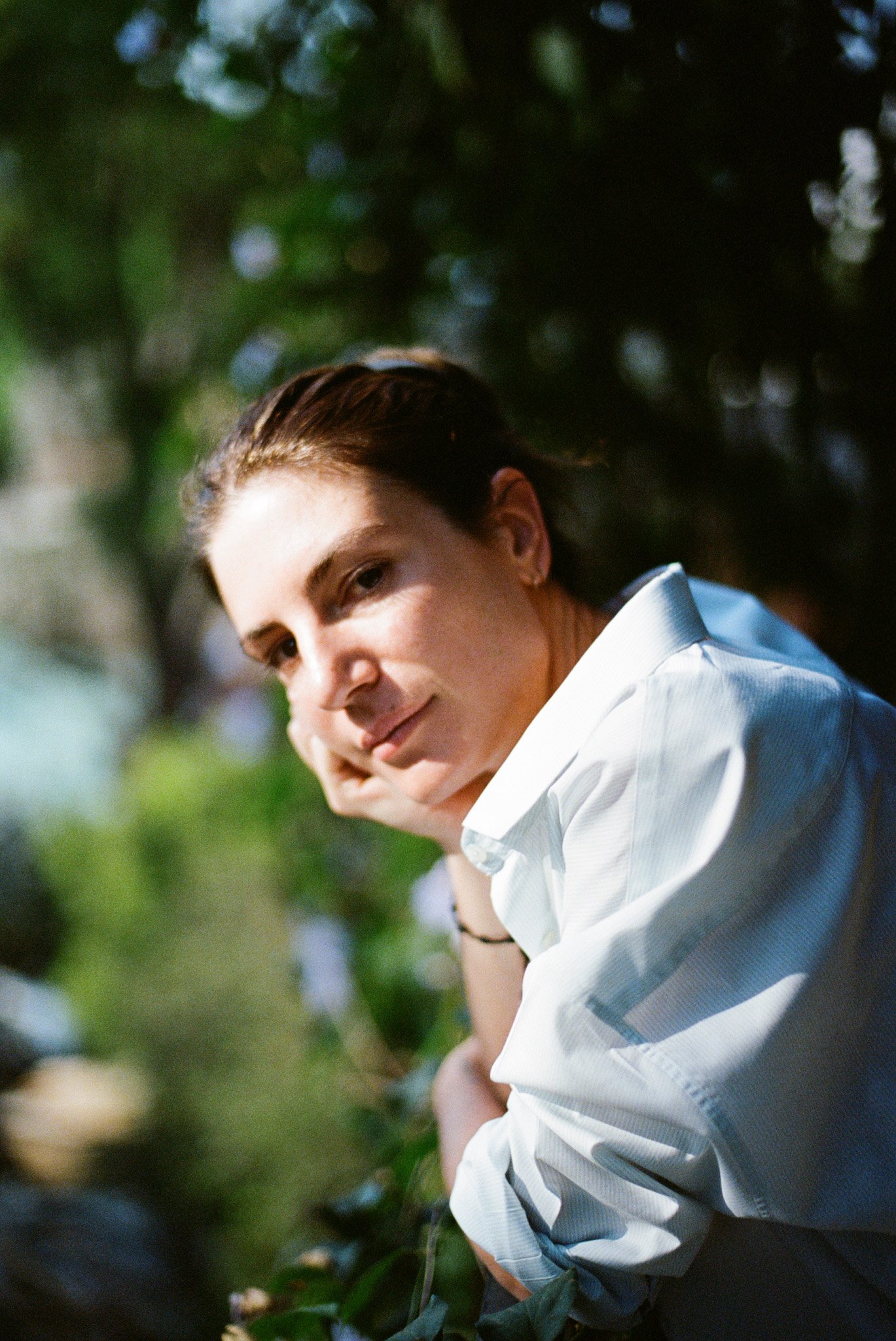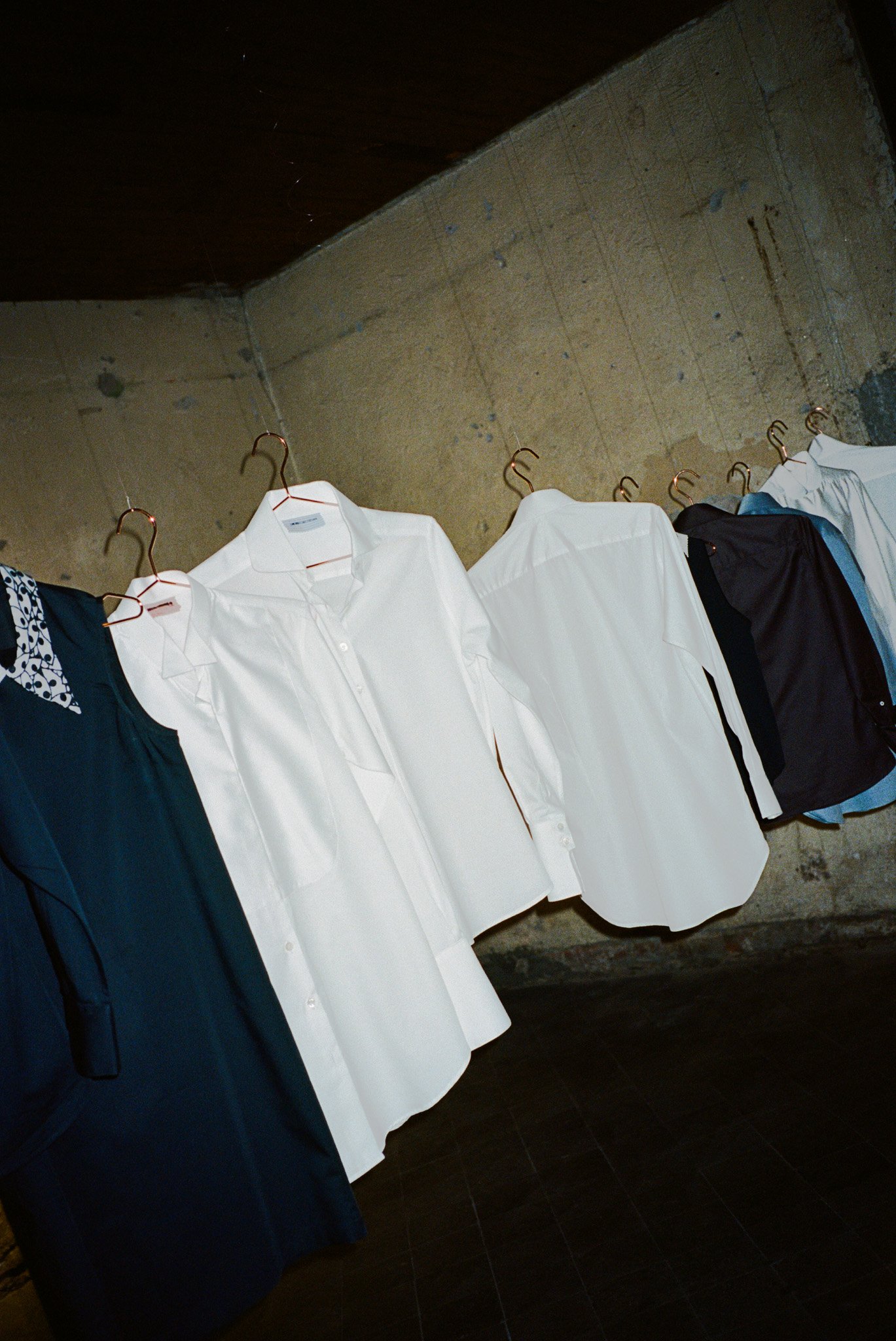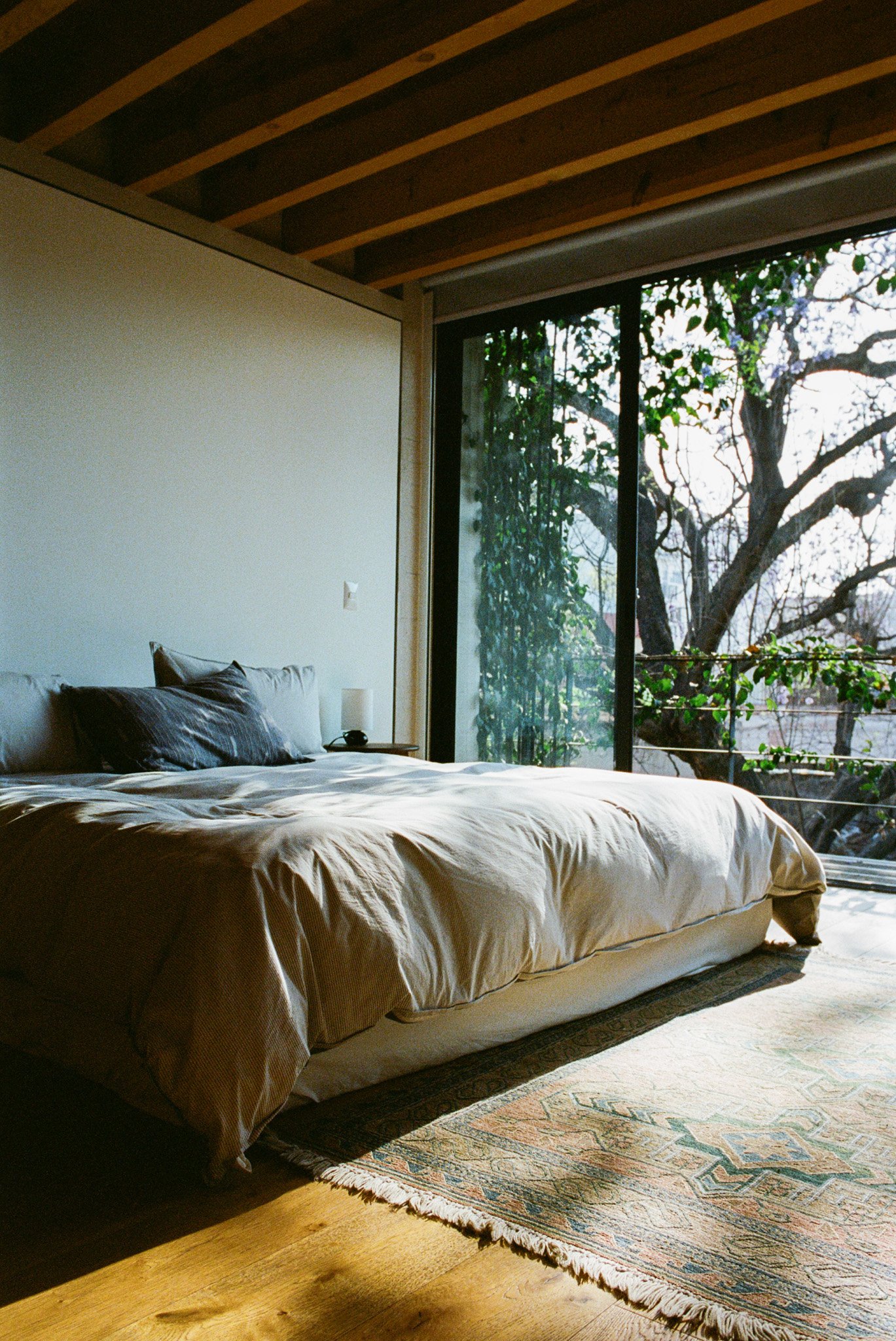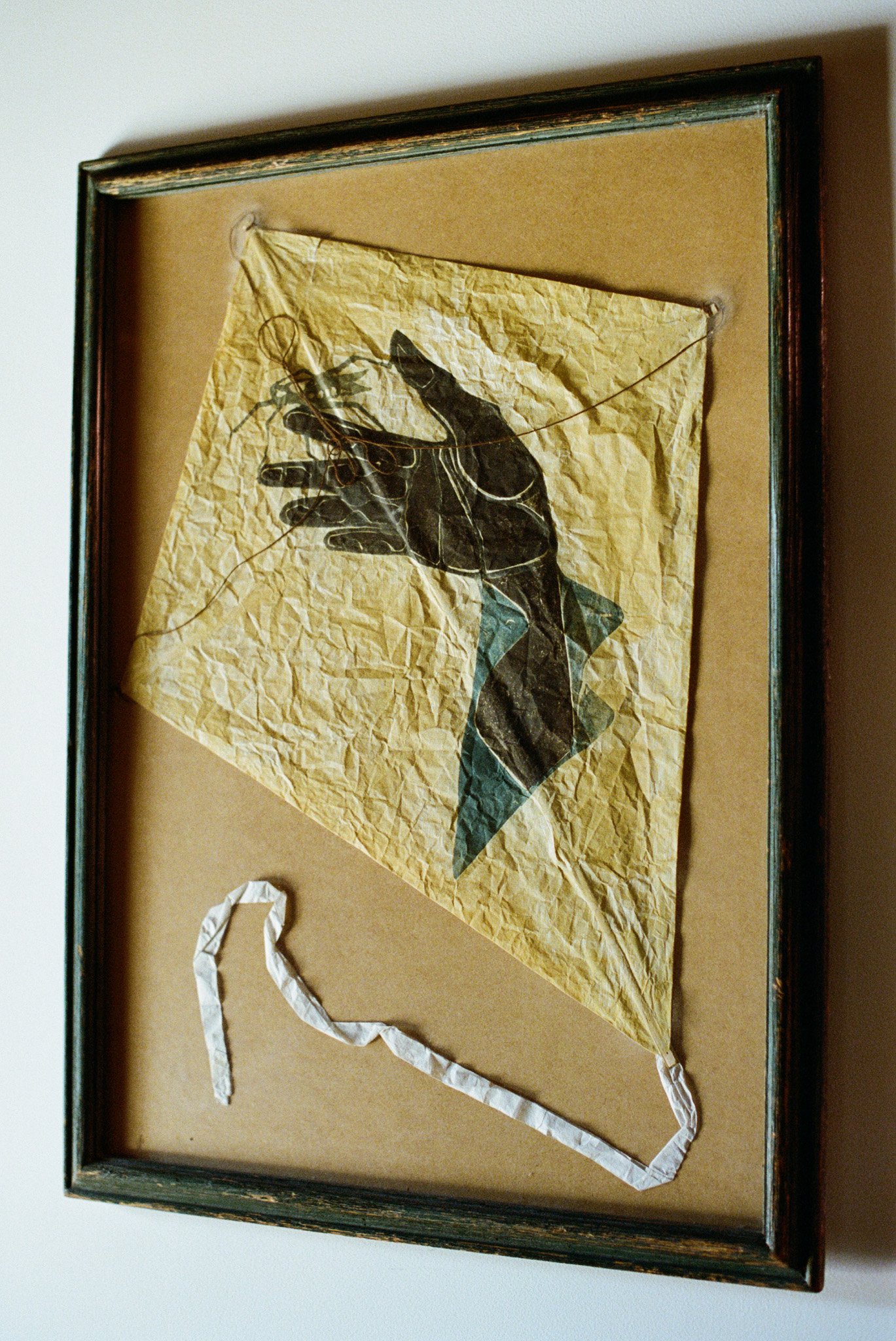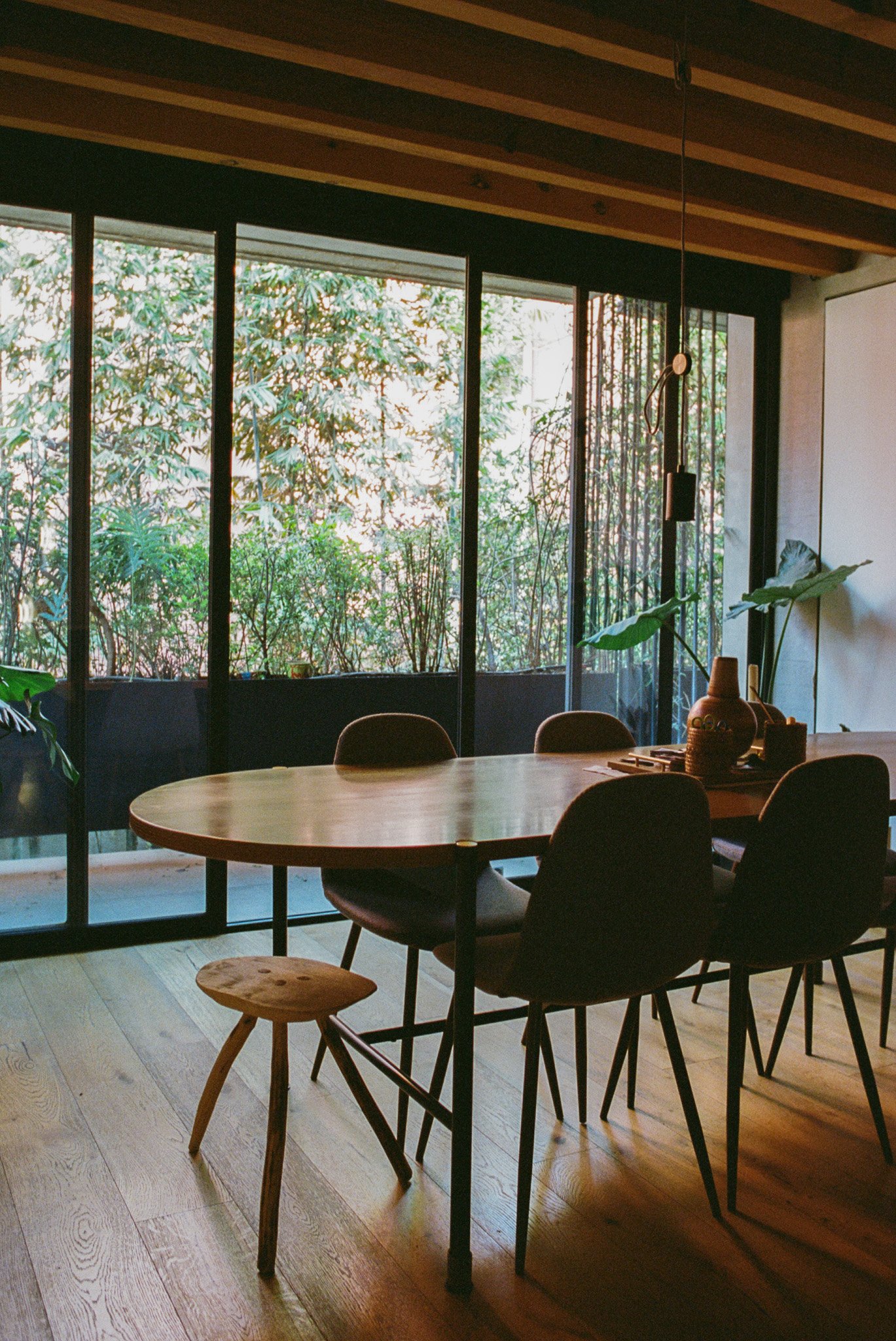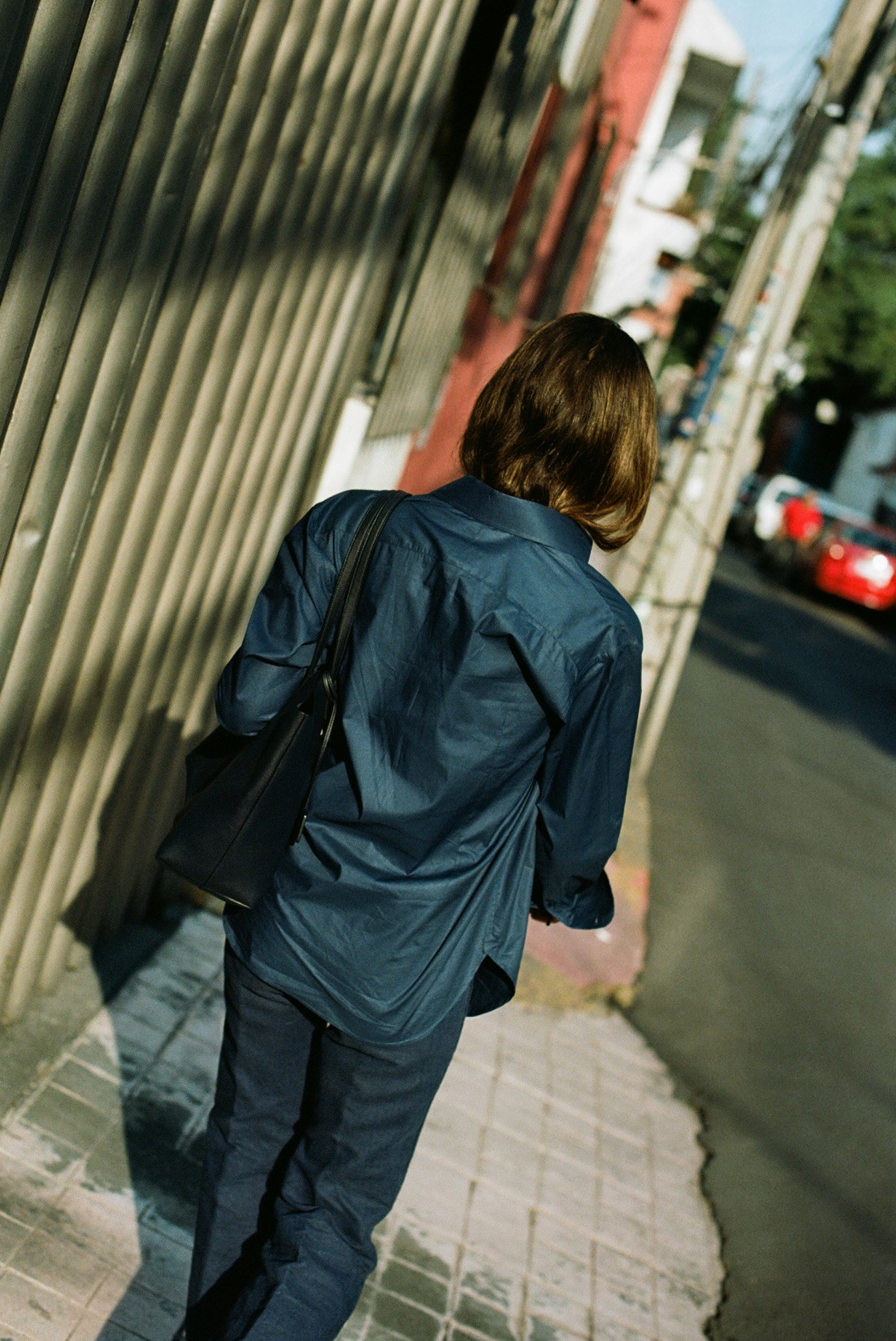This interview contains content that may be distressing, including brief mentions of eating disorders. Please be mindful of this before reading on, and reach out to us if you have any questions.
Olivia Villanti’s appreciation for the understated romance of everyday gestures is woven into the simple but studied clothing made by Chava Studio, the atelier she founded in San Miguel Chapultepec, Mexico City three years ago in partnership with Gilly e Hijos, a storied fabric import business run by Olivia's in-laws. You’ll most likely spot her in transit between her home and her studio in a tiny colonia just across the highway. Here, she shares with us how a childhood steeped in dance translated into a textured perspective on clothing as an agent of movement, the anxieties and affirmations of life as an expat business owner who cares deeply about community, and moments in which she’s glimpsed a type of magic forged within instances of human connection.
♫ Listen to olivia’s playlist | ⌨ olivia’s last google search
on her morning routine
I groggily get physically pulled out of bed around 6:45 AM by my seven-year-old son, Lalo, and immediately put on hot water to make instant coffee. I know this is a controversial thing to admit, but I like Nescafe drink it with some milk and agave while I make my son's breakfast. It’s either super lowbrow, like an Eggo waffle with agave and banana, or slightly more nutritious, like Ezekiel bread with ghee and nutritional yeast (which happens to be the only breakfast I eat if I even have breakfast at all). I walk Lalo to school and then go for a run in the park which is a few blocks away. Then, I answer emails, shower, and I’m at the studio by 10 AM. It's all very banal, but extremely grounding for me.
on her history with dance
I had a challenging relationship with dance, which led me to an eating disorder at a pretty young age. I learned how to zero in on food through ballet and became super aware of my body. Having to be in front of a mirror all the time, looking at myself, made the idea of controlling how I looked and how I ate much clearer to me as like a goal, as a healthy goal for a dancer. So much of my therapy at that point was focused on dance and on my mom, too, who, I will say until the day I die, had nothing to do with my eating disorder. Nobody can get their head around that, because there’s such a trope around pressure from your mom to be a certain way, and I feel like my mom had to deal with that. It wasn’t fair. I’m someone who’s always really desired control and the idea of my body changing and life changing dramatically was too much for me to bear. I’d always been a really skinny, scrawny girl. I really associated that with who I was, small and feisty.
I finally got a dance agent, but a lot of the stuff on offer was commercial. I would go in for tampon commercials where you had to, like, twirl around. I hated it. I felt after a year or two of doing it that that was not the path I wanted to be on, even though I still loved dance and can appreciate it now. I still love going out dancing for fun.
“My life is much more manageable here. It feels like I operate at a human pace, whereas in New York, I felt like I was on accelerated mode. I was on when you listen to podcasts at 1.5 speed.”
on her transition from dance into fashion
Dance has a very strong influence on how I work now on Chava. I didn’t really connect the dots in the beginning, but when I’m working on designs, I can now see that so many of the fabrics we use at Chava are exceptionally tactile, they feel really good on the body, and that influences the way that I design. I’m much more at ease when I’m in fabrics that feel really good on me.
My approach to design is a combination of factors, but when I feel closest to a design, it’s because I can see it could literally be on stage, on a dancer. The way the fabric falls when in motion…you can see the body, but the shirt gives it another layer of context. The pieces I feel closest to, that feel most like a reflection of myself, are the things that feel like they have a performative element.
on her everyday style
It's pretty minimal, very rooted in tradition. I have a massive collection of vintage denim. Front General Store in Dumbo is my source. I think The Row is beautiful and it always gives me ideas for how to dress. I think its minimalism is just gorgeous and the tailoring is exceptionally inspiring. I love what Maria McManus is doing from a messaging perspective and the way that she is creating a brand that feels really emotional and beautiful, but also very strongly articulated. I wear vintage and Chava, and every now and then I'll splurge on a bag or a shoe. My Belgian loafers I wear all the time. These Acne boots. Veda—I love a good leather jacket.
““I always felt embarrassed because I thought you couldn’t be a thoughtful, smart person and still care about aesthetics.””
on romanticized vs realistic childrearing
I had such a challenging experience becoming a mother. It wasn’t a pregnancy thing. I’ve never been somebody who has known how to ask for help—I’ve historically been really uncomfortable asking anyone for anything. My perception of motherhood before I became a mom was that you have this beautiful bond with your baby, and that’s all you need. You have this incredible intimacy, just the two of you, you don’t need a community. I know that makes no logical sense, but that was my romanticized vision of motherhood—having this really personal, special, insular experience. Then I became a mom and I was like “Oh my god, I can’t do this.” I was alone a lot, and I felt so confused about who I was, what my days were supposed to be like, how I was supposed to care for this person that I felt so in service of, exclusively.
Eventually, I started asking my mom to come help with Lalo once a week. She did, and saved my life. She and I have always been very close, but have had the usual mother-daughter challenges. When I became a mother, my ability to see, appreciate, and understand her changed so dramatically. Now, when I think about my mother it makes me want to cry, because I feel so close to her, and I’ve witnessed this incredible bond she has had with my child.
““I think I have to feel really settled and comfortable in my body to feel settled and comfortable in my life. I think we are all probably like that, but I have that awareness filtered through my dance background.””
on “the expat experience”
Upon moving to Mexico City, I really felt like an outsider and I felt so dependent on my husband, Guillaume, which was really unique. He and I have been together forever, so of course there's a natural dependency, but I'd always been able to do things for myself, and now there were silly things that I just didn't know how to do. To this day, I still feel like a lot of the domestic facet of life falls on Guillaume’s shoulders in a way that it didn't when we lived in New York. When you are an expat, you really have to find your independence. If you're someone like me, you have to do it quickly, because if you don't, you start to feel this weird… I don't know if I would call it restlessness, but there's this sensation of being in between two places. Founding Chava gave me a project that felt like it was mine, something that connected me to the community here. I love Mexico City, and I love this country so much. But there are still moments when I feel really lonely here.
on her beauty routine
I wash my face with whatever drugstore face wash, nothing fancy, although I did at one point have the new Doré face wash, which I loved, I just haven't restocked yet. I love Le Petite Marseillais body washes. Every Christmas, my mom gives me a care package of hippy beauty products like Smellz Good goat milk lotion and I love it. I also JUST ran out of the Doré creme which I think is one of the best facial moisturizers I’ve ever used. I almost never wear makeup, but if I do, I'll do a lip—usually MAC's “Snob” which is this super matte, pale pink shade that's really pretty. I still wear Le Labo's “Thé Noir.” Sunscreen always—I like Unseen Sunscreen by Supergoop. Other products I use include Maëlys cream, the Tara Harper resurfacing mask, and Everyday oil. I believe aging is a gift, so my version of a routine is more taking care of myself than trying to look a certain way. Getting here was a bumpy road, though! I haven't always felt this comfortable in my skin.
on what she’s reading and listening to
My friend Adeline de Monseignat, a working sculptor here in Mexico, wrote The Book of Ladders about all of these different interpretations of ladders in that world of art. The ladder’s functionality is turned on its head in many of these pieces, or it's made doubly functional, really, really long.
Las Cosas Pasan Por Algo, O No is a little book of poetry written by Alan Dàvila. It’s full of little idioms in Spanish that he re-words or rewrites so they gain different layers of significance. “It's your fault. It's not love's fault.” It's so silly. But it's these little things that are just poetry. “To miss someone is not a two person thing, it’s a one person thing.”
Other books I’ve loved recently are Modern Manners, This is Mexico City, and Call Me By Your Name.
Ever since I became a mom, I’ve been revisiting all the songs I loved as a teenager. I don’t know what the correlation is because Lalo is obviously not a teenager yet, but I feel like this nostalgia was awakened in me. Even when he was a baby and I would nurse him to sleep, I would listen to all this old stuff—REM, which I loved when I was younger, U2, Tori Amos. It’s so funny, because Lalo’s “night-night” playlist is essentially a snapshot of me as a teenager. He loves music, and we have similar tastes in it. Bruce Springsteen, of course, ‘cause I’ll forever adore him. Heather Nova, Indigo Girls, Tracy Chapman, Milla Jovovich… I was really into her album when it came out.
olivia’s favorite spots in cdmx
Restaurants: Mariscos Don Vergas, Hugo el winebar (for the gnocchi especially)
Free Meditation: Safe Space
Art: Casa Ortega
interview and images by clémence polès, edited by em seely-katz

